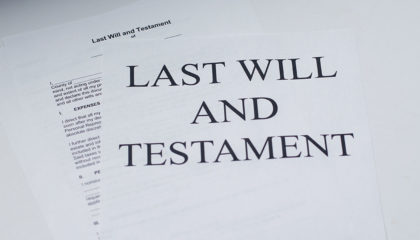Estate Litigation Cases
Disputes over estates seem to more common than in the past. One reason for this that estates have become larger for many property owners as a result of high real estate prices in the Vancouver area and British Columbia.
Some people engage accountants and estate solicitors to help them develop estate plans that both minimize the taxes that may accrue as a result of death (deemed capital gains) and the chances that their successors (spouse and children) will have a dispute over their will.
However even good estate plans are not a guarantee against estate litigation and most people do not engage in complex estate planning before they die. For many, the only estate planning they engage in is to execute a will and possibly make substantial gifts while still alive. In addition, some take steps to hold certain assets (such as land, a condo or a bank account) in joint tenancy.
Because the law of joint tenancy provides that when one joint tenant dies, his or her interest in the property passes automatically to the surviving joint tenant(s), that interest does not form part of the deceased person’s estate and is said to ‘pass outside of the will’.
If a spouse or a child of a deceased person feels that he or she has been treated unfairly as a result of a will or the passing of property outside of the will, the laws of Canada and British Columbia provide a number of possible grounds to challenge a will or a transfer of property before death.
Challenges to Wills
Wills may be challenged on technical grounds, namely that the form of the will does not comply with the formal rules determining what is a valid will. Examples of those formalities include whether the will was properly signed and witnessed. Notable recent changes to the law in the B.C. Wills, Estate and Succession Act (WESA) allow for documents that do not meet the formal requirements of a will to be given the effect of a will as long as the Court is satisfied it reflects the testamentary intention of the deceased person.
Wills can also be challenged on the basis that at the time the will was made, the will-maker lacked the required mental capacity to make a will or was subjected to undue influence when he or she made their will. If either lack of capacity or undue influence is proven, the will has no effect and either an earlier will takes effect or an intestacy results.
Wills Variation
Under the rules established by WESA, it may also be possible to have a Court declare that an otherwise valid will should be varied or changed because it fails “to make adequate provision for the proper maintenance and support of the will-maker’s spouse or children”.
As noted, only spouses or children can ask the Court to vary a will. In exercising its discretion to determine whether a will treats a spouse or child unfairly, the Court will consider what legal and moral obligations the will-maker had. For example, spouses and underage children have a legal right to be supported by their spouse/parent and therefore if the will fails to make any, or inadequate provision for that provision, it is at risk of being varied by the Court.
A will-maker is also considered to have a moral obligation to make provision for all of their children in their will and a failure to provide for an adult child may result in a Court order varying the will in that child’s favour. However, that rule is not absolute. A will-maker may have a good reason to treat adult children differently, for example if the child had ignored or mistreated the will-maker. In such a case, the Court may find the will-maker was justified in his or her decision and the will should be upheld. Before deciding to vary a will, the Court will consider a number of factors including the size of the estate, what assets if any were transferred by the will-maker when he or she was still alive, and the relative financial positions of the successors.
Resulting Trusts
Another important area of estate litigation involves assets that were transferred before the will-maker died. The common law of Canada provides that if a gratuitous transfer of property occurs between a parent and an adult child, there is a presumption that the child holds the property transferred to them in trust for the parent. This law applies to transfers of property (for example, land, a vehicle or money) and to transfers of a part interest in property such as adding a child as a joint tenant of a piece of land or to a joint bank account.
Where the presumption of resulting trust applies, the child who received the property has the burden of proving that the transfer was a gift. Sometimes the child does not dispute that the property was not a gift and should be part of the parent’s estate. Other times, it will be clear the transfer was a gift because the parent wrote “gift” on the cheque or executed a declaration of gift in respect of land.
In other cases, the intentions of the person transferring the property may be unclear with the result that successors may seek to litigate that issue. Those situations require a close examination of the circumstances of the transfer and anything that was said or written about the transfer at the time.
Types of Disputed Estates
When trusts, wills, and estates are at issue, many different types of legal disputes may arise. Some of the estate litigation cases we handle involve the following issues:
- Inheritances under the Wills, Estates, and Succession Act
- Incapacity
- Guardianships and committees of estate
- Patients Property Act
- Certificates of Incapability
- Elder abuse
- Claims against executors and trustees
- Contested trusts
Each of these legal issues requires knowledge and understanding of the relevant laws, which may be complex and ever-changing. For this reason, the lawyers of McLarty Wolf strive to stay fully informed of new and changing legal perspectives and strategies to improve the efficiency and success of each of our estate litigation cases.
Estate Litigation Terms
It is very difficult when a close family member or friend passes away. If there is litigation over the estate of that person, the process will seem even more overwhelming. Whether currently involved in estate litigation or not, it can be helpful to have a basic understanding of common Vancouver estate litigation terms.
Beneficiary: An individual named in a will to receive some portion of an estate. A beneficiary can also involve a beneficial interest in a trust.
Descendant: A descendant is a relative in the direct line of descent such as the children, grandchildren, and great-grandchildren of an individual.
Estate: The property owned by an individual including financial accounts, cash, real estate and personal property.
Executor: An individual named in a will to follow the directions of the deceased and to carry out the terms of the will.
Intestate: The state or condition of dying without having made a valid will or without having disposed, by will, of a segment of the property of the decedent.
Probate: The process in the Supreme Court of B.C. whereby a will is proved and accepted as valid.
Will: A written statement, usually signed, made by an individual, which directs the distribution of their property when they die.
Wills, Estates and Succession Act: The WESA Act is the British Columbia statute that sets out the legal principles regarding the making and validity of wills, the distribution of an estates where there is no will, will’s variation claims, and the probate and administration of estates.
Will-maker: An individual who makes a will.
Will’s variation: a legal claim by a child or a spouse of a will-maker that the will makes inadequate provision for the child’s/spouse’s maintenance or support.
When a person with a will dies, the executor appointed by the will must obtain a grant of probate from the Court in order to pay the will-maker’s debts and distribute his or her property to the persons named as beneficiaries in the will. Any person who questions the validity of the will or who claims that the will should varied in their favour, would then have the opportunity to have that claim resolved by the Court.











